Living a low carbon lifestyle is crucial in the fight against climate change, as it directly contributes to reducing one’s carbon footprint. By making sustainable choices in daily life, such as using renewable energy sources, adopting energy efficient practices, and choosing eco friendly products, individuals can significantly impact the environment. Transportation choices, such as walking, cycling, or using public transit, also play a role in minimizing carbon emissions.
Additionally, embracing a plant based diet and reducing meat consumption contributes to lowering the overall carbon footprint. These conscious choices not only benefit the environment but also promote a healthier and more sustainable way of living. Recognizing the impact of individual actions is the first step towards a collective effort to address climate change and create a more sustainable future for generations to come.
Table of Contents
ToggleReduce Meat Consumption:
Reducing meat consumption is a pivotal step in mitigating climate change and minimizing the environmental impact of livestock farming. One effective approach is incorporating more plant based meals into your diet. Plant-based diets generally have a lower carbon footprint, as the production of plant foods tends to generate fewer greenhouse gas emissions compared to raising livestock. By choosing a variety of fruits, vegetables, legumes, and grains, individuals can contribute to a more sustainable food system.
When opting for meat, choosing locally sourced and sustainably produced options is another impactful strategy. This promotes responsible farming practices and helps reduce the carbon footprint associated with transportation. Locally sourced meats often require less energy for transportation and refrigeration, thereby lowering overall emissions.
Livestock farming is a major contributor to greenhouse gas emissions, including methane and nitrous oxide. By cutting down on meat consumption, individuals can directly contribute to the reduction of these emissions. This shift in dietary choices not only benefits the environment but also supports a healthier lifestyle. Embracing a more plant centric diet and making mindful choices about meat consumption can collectively lead to a positive impact on both personal well being and the planet’s health.

Use Renewable Energy:
Utilizing renewable energy is a pivotal step in fostering a sustainable and environmentally conscious lifestyle. One effective measure is to switch to renewable energy sources, such as solar or wind power, for your home. Installing solar panels, where feasible, is a direct way to harness clean energy and reduce reliance on traditional power sources. Additionally, individuals can opt for green energy plans offered by utility providers, supporting the integration of renewable sources into the overall energy grid.
Renewable energy plays a crucial role in decreasing dependence on fossil fuels and mitigating the harmful effects of climate change. Unlike fossil fuels, renewable sources like solar and wind power generate electricity without emitting greenhouse gases, thus contributing to a cleaner and greener environment. By choosing renewable energy options, individuals actively lower their carbon footprint, promoting a more sustainable energy landscape.
Embracing renewable energy not only benefits the planet but also encourages the development and adoption of cleaner technologies. It is a proactive step towards building a future where sustainable energy sources are the norm, fostering a healthier planet for current and future generations.
Conserve Water:
Conserving water is a fundamental aspect of promoting environmental sustainability and reducing the ecological impact of human activities. One practical step is to promptly fix leaks in your home, as even small leaks can result in significant water waste over time. Regularly checking and repairing leaks helps to minimize unnecessary water consumption and ensures responsible resource management.
Another effective strategy is to use water saving appliances and fixtures. Technologies such as low flow toilets and efficient faucets contribute to reducing overall water usage in households. Additionally, being conscious of water consumption in daily activities, such as taking shorter showers or turning off the tap while brushing teeth, can make a substantial difference.
For those interested in more proactive measures, collecting rainwater for non potable needs like gardening is a sustainable approach. This not only reduces reliance on treated water but also promotes the efficient use of natural resources.
Mindful water usage not only conserves a precious resource but also plays a role in minimizing the energy required for water treatment and transportation. By adopting water saving practices, individuals contribute to a more sustainable and resilient water ecosystem, helping to protect this vital resource for future generations.

Embrace Sustainable Transportation:
Embracing sustainable transportation practices is a key strategy in promoting environmental conservation and addressing the challenges of climate change. Opting for alternatives like walking, biking, or utilizing public transportation instead of driving alone significantly reduces carbon emissions associated with individual vehicle use. These choices not only decrease air pollution but also contribute to alleviating traffic congestion in urban areas.
Choosing fuel efficient or electric vehicles when possible is another impactful way to support sustainable transportation. Electric vehicles, in particular, produce fewer emissions and help diminish dependence on fossil fuels. As the infrastructure for electric vehicles continues to expand, incorporating these eco-friendly options into daily commuting becomes increasingly feasible.
Carpooling or ride sharing is an effective means of reducing the number of vehicles on the road, further lessening traffic related emissions. By sharing rides, individuals can optimize transportation resources, lower their carbon footprint, and foster a sense of community.
Embracing sustainable transportation options is a collective effort that yields positive impacts on both local air quality and the global climate. By making informed choices about how we move from place to place, individuals contribute to building a more sustainable and resilient transportation system, essential for a cleaner and healthier environment.
Minimize Single Use Plastics:
Minimizing single use plastics is a vital step towards mitigating the environmental impact of plastic pollution. Opting for reusable bags, water bottles, and containers is a simple yet powerful way to reduce reliance on disposable plastics. This conscious choice not only decreases the demand for new plastic products but also minimizes the volume of plastic waste that ends up in landfills and oceans.
Saying no to single use plastics, such as straws and disposable cutlery, is another impactful measure. These items are often used briefly and discarded, contributing significantly to pollution and environmental degradation. By choosing sustainable alternatives like bamboo or stainless steel straws and reusable cutlery, individuals can actively reduce their plastic footprint.
Furthermore, selecting products with minimal or eco-friendly packaging is essential. Excessive packaging, often made from non recyclable materials, adds to the overall plastic waste problem. By supporting products with eco-conscious packaging, consumers contribute to a more sustainable and circular economy.
While recycling is important, minimizing overall plastic consumption takes precedence. By adopting a lifestyle that prioritizes reusable alternatives and eco-friendly choices, individuals play a crucial role in reducing the pervasive environmental impact of single use plastics.

Conclusion:
In conclusion, adopting a sustainable lifestyle involves a series of mindful choices that collectively contribute to environmental conservation. From reducing meat consumption and embracing renewable energy to minimizing single use plastics and conserving water, these actions play a crucial role in mitigating climate change and promoting a healthier planet. Sustainable transportation options, energy conservation practices, and eco-conscious choices in daily activities further enhance individual efforts toward a more environmentally friendly lifestyle. Recognizing the interconnectedness of these actions and their cumulative impact is essential. Each small change contributes to a larger, positive shift towards a sustainable and resilient future.
By making informed choices in our diets, energy consumption, transportation, and daily habits, individuals can actively participate in the global movement towards a more sustainable and harmonious coexistence with the planet. Ultimately, the collective efforts of individuals embracing these sustainable practices contribute to building a healthier and more sustainable world for current and future generations.
FAQs:
What is zero carbon lifestyle?
Embracing a zero carbon lifestyle involves minimizing personal carbon emissions, striving to eliminate or offset one’s carbon footprint through eco-friendly choices in daily living, such as sustainable consumption and carbon-neutral practices.
How do you live low carbon?
Living low carbon entails adopting energy efficient habits, reducing waste, opting for sustainable transportation, and making eco-conscious choices in consumption, thereby minimizing individual contributions to greenhouse gas emissions and environmental impact.
What are low carbon practices?
Low-carbon practices encompass actions like energy conservation, waste reduction, and embracing renewable energy sources. These include using energy efficient appliances, recycling, composting, and supporting eco-friendly technologies to actively reduce personal and societal carbon footprints.
What is low carbon behavior?
Low carbon behavior involves consciously making environmentally friendly choices in daily life. This includes sustainable purchasing decisions, responsible resource use, and supporting initiatives that promote a greener, more eco-conscious lifestyle, ultimately contributing to a lower carbon impact on the planet.
Images ‘Designed by Freepik‘

